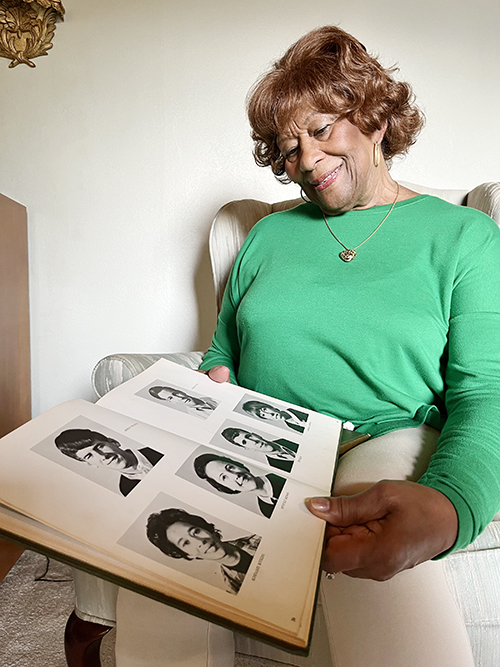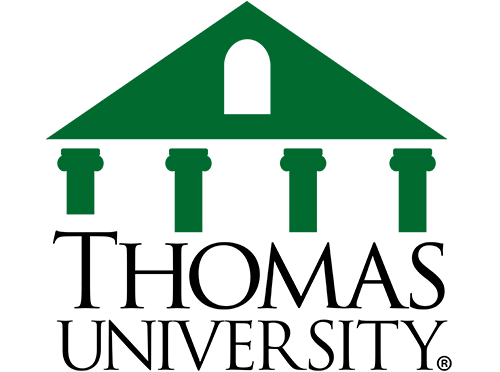Rosemarye Boykins: TU’s first African-American graduate
Post Published On:Story and photo by Taylor Weeks, Student writer
In the spring of 1968, Rosemarye Boykins, a married mother of two daughters, received her Associate degree from Birdwood Junior College. In doing so, she became the first African-American graduate from the institution paving the way for others.

Born and raised by her grandparents in Covington, Georgia, Boykins lived a quiet life with her family in Thomasville until she and her husband, educator Samuel Lewis Boykins, began planning for her to further her education. At the time, they thought that meant attending a historically Black college.
“My husband and I talked about my going to an HBCU school, which was 60 miles away from here,” she said. “The plan was for me to stay there. The more I thought about it, the less comfortable I felt about it. I just could not leave those two little girls and my husband. I just could not do it.”
After considering her options, Boykins decided a nearby college that was not an HBCU would enable her to pursue her educational goals while still being with her family. After much consideration and deliberation with her husband, she decided to apply for admission to Birdwood Junior College, what is now Thomas University.
Prior to her enrollment, no other African American had ever attended Birdwood Junior College. Undeterred and brimming with determination, Boykins decided to phone the school.
“I got on my phone and called John Holt, the Dean of Birdwood Junior College,” Boykins said. “I asked him if they had ever admitted African-American students. He stated that none had ever applied. It was at that point, that I told Mr. Holt that I wanted to move forward with my application.”
She began taking classes in the Fall of 1967, but she would not be the only African-American student at the school for long. The next semester Artis Johnson, Eddie Sandford and Freddie Sandford joined her on campus.
Boykins recounts a long list of faculty and staff who encouraged and guided her during her time at Birdwood, but not everyone was so welcoming.
“One of the most hurtful experiences for me was when I was sitting in class and no one would sit in front of me, behind me, or beside me,” she said.
Boykins recalls another incident involving a fellow student.
“The other thing that happened that really stands out was on a Monday after class,” she said. “It was pouring rain. I did not have an umbrella. I asked a white female student if I could walk under her umbrella with her back to the parking area after class. She jumped away from me as if I were going to attack her, so I said, ‘Never mind. I’ll get wet. Never mind.’”
Although her attendance at Birdwood was a noteworthy milestone for the college and community, not everyone saw this as a positive event. Some Caucasians and African Americans shunned her and made negative comments about her breaking the color barrier among students, Boykins, said.
Despite all the negativity and isolation, she could always find solace within her home and receive encouragement from her husband. He reminded her that she was quite capable to hold her own among ANY group of students ANYWHERE. He also added that her grandmother always had high expectations of her and was confident that she would successfully complete her journey at Birdwood.
Boykins finished requirements for the Associate degree in December of 1967 and participated in the commencement ceremony in the spring of 1968. Boykins then earned a bachelor’s degree in Education from Valdosta State College and began a career as an elementary school educator in Thomasville City Schools. She later earned a master’s degree in Education from Valdosta State College. Boykins went on to study Social Work at VSC and transitioned from being a teacher to being a social worker for students in Thomasville City Schools.
She was named one of only 10 Georgia Milken Educators in 1991. The Milken Family Foundation recognizes exemplary educators with a $25,000 award and a week-long trip to California. Boykins continues to be active with the Milken organization.
Even after retiring in 2000, she remains active in her church, St. Mark AME, the Thomas County Food Bank, and several other community organizations.
“I have a very fulfilled life,” Boykins said. “I believe I have a special calling on my life which compels me to live a life of serving others. This is a calling which I cannot ignore.”

